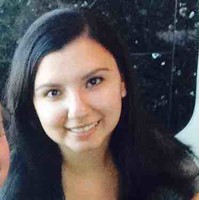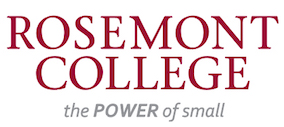The Psychology of a Pandemic
Joe Darrah - March 4, 2021
 Elizabeth Becks ’20, knows all about adaptability. During her first semester as a graduate student in
Rosemont College’s psychology program, she learned that she was pregnant with her
first child. And although that changed the course of her course-taking a bit, she
was undeterred — earning her master’s degree in 2020 while working two internships
along the way. Today, as a first-semester student in the doctoral program at Holy
Family University in Northeast Philadelphia, Becks, like so many others, has been
forced to rethink her mode of education due to the coronavirus pandemic after being
accepted to the program last February just before shutdowns began across the country.
But again, she’s persevering. She’s studying virtually, sometimes along with her son,
who is now 4 years old, and she’s learning to assimilate to online learning, even
if the challenges seem daunting at times.
Elizabeth Becks ’20, knows all about adaptability. During her first semester as a graduate student in
Rosemont College’s psychology program, she learned that she was pregnant with her
first child. And although that changed the course of her course-taking a bit, she
was undeterred — earning her master’s degree in 2020 while working two internships
along the way. Today, as a first-semester student in the doctoral program at Holy
Family University in Northeast Philadelphia, Becks, like so many others, has been
forced to rethink her mode of education due to the coronavirus pandemic after being
accepted to the program last February just before shutdowns began across the country.
But again, she’s persevering. She’s studying virtually, sometimes along with her son,
who is now 4 years old, and she’s learning to assimilate to online learning, even
if the challenges seem daunting at times.
“It’s not the same as being in the classroom; you don’t connect with your peers the
same way,” said Becks, who resides in the Allentown, PA, area and is eager to drive
more than an hour each way to school once it’s deemed safe enough to have that social
interaction. “But I’ve definitely learned that nothing is going to be what you’ve
planed for and that you need to be prepared for anything.”
That ability and willingness to be versatile is not unlike the mindset that she counsels
many of her young clients to develop and maintain as they too face similar obstacles
while living with anxiety, hyperactivity, attention disorders, and other mental health
issues in her part-time work as a psychotherapist. She’s realizing more that with
each passing, day, class, and client interaction that she’s navigating a unique opportunity
to serve her clients and their families as a healthcare provider facing many of the
same circumstances as they all are in real time while bringing an added perspective
as a student who’s literally living the research on how to address mental health during
this pandemic.
Anxiety All Around
As the pandemic enters its second year of varying degrees of quarantining and forced isolation, Becks says that the issue of chronic anxiety has become more prominent than she’s ever seen before. “Anxiety, regardless of the person’s age, has been a huge problem,” she said. “It’s a pattern among all of my clients.”
The dynamic is really twofold: there is general amount of worry about the virus itself and the threat that it has proven to pose to people of all ages, as well as an impact on general anxiety experienced by those with previously diagnosed disorders.
“We’re indoors so much right now; we’re not out socializing, and that causes increased
anxiety,” Becks said. When it comes to children, however there’s more of a tendency
for anxiety to have manifested in the face of the pandemic. Becks said she is currently
counseling kids who had not been diagnosed with anxiety prior to last year, but that
the realities of not being able to safely visit with friends and family and to not
be able to attend school or engage in typical recreational activities has had severe
mental and emotional health consequences.
“Many don’t like attending school virtually,” Becks said. “They tell me that they’re
not able to learn their subjects because it’s difficult to focus or that issues with
internet connections and technology problems can prevent their teachers from hearing
them when they’re trying to communicate or ask questions. Not being able to socialize
has been very difficult for them. I’ve had kids come to me crying because they want
to see their friends.”
As the pandemic has lingered, there’s also been somewhat of a shift in where virus-related anxiety stems from in Becks’ experiences as well.
“When the pandemic started, kids would tell me that they were afraid of getting sick or dying,” Becks said. “So there definitely has been a fear of covid itself, but today the anxiety is more about wanting to be in the classroom, and a realization that not being able to socialize has increased their anxiety. They’re not as afraid of covid itself as they once were. It’s easy to realize in this field how important socialization is, especially for kids. They cannot get used to this way of living.”
With the opening of schools taking more affect, Becks said that many of the conversations that she has today with clients and their families are about taking the proper safety measures. One of the positives, from an emotional and mental health standpoint, as the pandemic has continued has been the lessened stigma on mask wearing among kids and a better understanding of how taking certain precautions can allow for more socialization.
“There is a mental health impact on kids who wear masks all the time, but there is not as much as a mask stigma anymore,” she said. “The kids are so happy to get back to class that they’re willing to do what it takes to maintain the little classroom time that they have. But we do find it important to talk to these children about how wearing a mask may be affecting them at the same time.”
Pressure of a Pandemic
With a background in child development as well as caring for clients who are experiencing a range of clinical and social circumstances, including those who are victims of trauma and those who are living with a cancer diagnosis, Becks is well versed in working with those who rely on her to help them get through their most challenging days. That’s never an easy task, but at the same time she certainly recognizes expectations on her as a counseling professional being heightened and clients being more sensitive to needing help today.
“There’s a lot of pressure to be in this field today,” she said. “Even though we’re only supposed to guide our clients, there is a pressure to help them with whatever it is that they are going through.”
And though there’s not a drastic change in care delivery today due to the pandemic, Becks says that facing the challenges as a person herself makes the job that much more challenging, without much separation of boundaries.
“You leave your sessions, and then you have to consider your own issues,” she said. “So there’s also a pressure to take care of yourself so that you can take care of your clients. And that’s been the biggest challenge for me.”
In her current part-time role with Pinebrook Family Answers, an outpatient facility that provides children and youth services, community/school-based programs, family support services, mental/behavioral healthcare, senior care, and re-entry programs for the Greater Lehigh Valley, Becks works as a part-time psychotherapist in the organization’s outpatient department, primarily with 5-to-25-year-old clients. Most of her population needs help with managing anxiety, hyperactivity, and attention disorders. Assistance is often needed with learning how to communicate effectively on an individual and family level. She’s been with Pinebrook since 2019, when she earned an internship while at Rosemont, and has been working with some clients ever since, and is beginning to see some of her original clients successfully be discharged despite the pandemic.
A first-generation college student who earned her bachelor’s in psychology from Cedar Crest College in Allentown, Becks said she has been interested in psychology since she underwent major back surgery as a child and, upon leaving the hospital after a week’s stay, wanting to go back to help the other kids.
“And I knew I wanted to focus on mental health because the experience was stressful and traumatizing for me,” she said. After earning her BA, Becks began working with children with autism, and the passion that she experienced with that population helped her to understand that working with children was what she wanted to do with her career.
It’s a career that she sees widening with opportunity and need as we transition into a post-pandemic reality.
“The pandemic has increased the need for our work; we’re needed now more than ever” she said. “I’m lucky to be in a profession that is so needed. It’s difficult to adapt to our world today, and people will continue to need that guidance. To be able to ask for help or to just vent. That conflict is occurring among families because communication is not always handled properly. It’s definitely a unique time to be a counselor.”
Social Media Versus Social Justice
With the presumed end of the pandemic in sight, other determinants that are bound to keep counselors engaged with their clients are issues related to social unrest and change, Becks believes. Again, an interesting dynamic is present among younger populations who are exposed to more people and dangers at an earlier age through digital technology and social media, but at the same time they are being given access to more information in a society that is increasingly becoming more cognizant of inequities and the need to discuss them—which should benefit mental health if their exposure to content and stimuli are carefully observed.
“Kids today are more willing to talk about things, there’s an innocence that allows them to say what they think,” Becks said. “They’re not as worried about what others will think about things that scare them, or make them uncomfortable, or that they believe is just wrong. Kids are more aware of topics today because things are talked about more today. And kids need to be aware of what’s going on in the world around them. Today’s kids are getting that.”
There’s an onus of responsibility on parents and providers to help children absorb everything going on around them in a healthy manner, and that’s a challenge Becks said she embraces, both as a healthcare provider and a mother.
“I have a lot more hope in the future generations because they are more open to talking about things like racial injustice and not standing for things like stereotyping,” she said. “The kids who I work with are talking more about these factors than it was talked about when I was younger. I’ve even seen a difference since the time that I was an intern. And, professionally, we’re seeing more multicultural training and talking about issues to learn more about one other. And the kids who are going through this pandemic are getting the opportunity to be more open-minded about different cultures, races, and lifestyle choices today. It’s definitely not what I grew up with, but I’m glad that my son will.”
